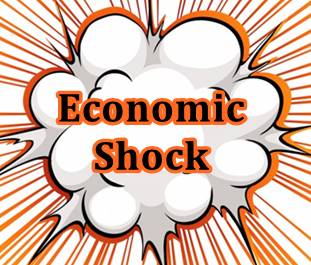Economic Shock
What is an Economic Shock?
An economic shock denotes any relationship that leaves a significant impact on the outcomes of macroeconomic, alterations happening to fundamental macroeconomic variables and even economic performance measures, like Inflation, consumption, and unemployment.

Often, these shocks remain unpredictable and are generally the result of events that were considered beyond the scope of usual economic transactions. On the Economy, these shocks leave a lasting and widespread effect. Not just that, but they can also be the cause of economic cycles and recessions.
Explaining Economic Shocks
Economic shocks can be diversified as primarily affecting the economy either through the side of demand or supply. They can also be diversified on the Basis of their origin within or impact on a certain sector.
Considering that the industries and markets are interconnected in an economy, large shocks to either demand or supply, in any sector, can have a major macroeconomic impact. In a way, economic shocks can either be helpful or harmful to the economy.
Here are a few types of shocks existing in the economy:
Talk to our investment specialist
Demand Shocks
Demand shocks take place when there turns out to be a significant and sudden shift in private spending patterns, either from businesses’ investment spending or consumer spending. An economic downturn of a substantial export Market can leave a negative shock to business investment, specifically in export industries.
Furthermore, demand shock can also happen because of supply shocks to consumer commodities with inelastic price demand, like food and energy.
Supply Shocks
A supply shock is one such event that makes production, around the economy, more costly, difficult and sometimes even impossible for a few industries. An increase in the cost of essential commodities, like oil, and more, can make the fuel prices go skyrocket; thus, turning them even expensive for the purpose of business.
Apart from that weather events, man-made events, or natural disasters, such as floods, wars, terrorist attacks, hurricanes, or earthquakes can create supply shocks as well
Financial Shocks
A financial shock is the one that comes from the economy’s Financial Sector. As modern economies are extremely dependent upon the flow of credit and liquidity to fund payrolls and operations; financial shocks can leave an effect on every Industry in the economy.
Rapid devaluation of the currency, unpredictable alterations in monetary policy, liquidity crisis in the baking system, and stock market crash are some of the financial shocks examples.
All efforts have been made to ensure the information provided here is accurate. However, no guarantees are made regarding correctness of data. Please verify with scheme information document before making any investment.












